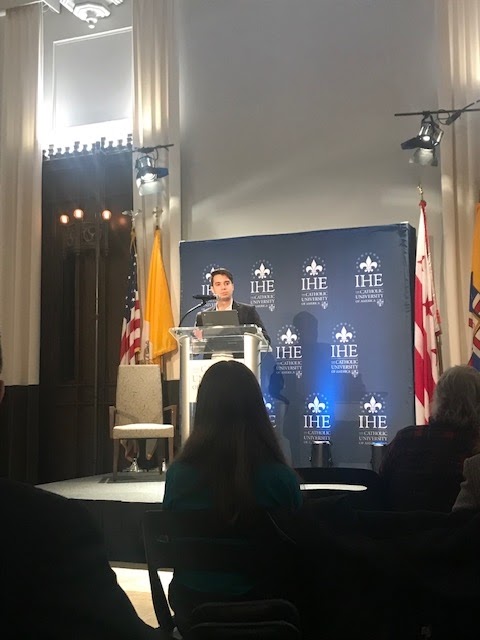Venezuela: My Story, Your Future?

Andrés Guilarte speaking at Heritage Hall about his experience living in Socialist Venezuela. Photo Courtesy of Franchetta Groves
The Busch School of Business and The Institute for Human Ecology at Catholic University gave students the opportunity to learn more about the turmoil that Venezuela faces from the perspective of someone who experienced first hand the economic crisis of this once prosperous country. Andrés Guilarte left his home country of Venezuela after watching socialist policies create an economic crisis, a culture of fear, and a crisis of trust within the government.
The event was open to the public as well as Catholic University students. Many individuals from the community were present as well as several students.
On January 22 at Heritage Hall, Guilarte shared that, in April of 2017, he was a normal college student facing the struggles of homework, classes, and projects at the Central University of Venezuela. Yet unlike average college students, he faced external challenges and threats from the socialist government of Venezuela. Class would be interrupted by tear gas attacks which targeted students who spoke out against the government.
Guilarte along with his peers took to the streets in protest on April 19, 2017. Yet this made them targets from the government and gangs called collectivos. These are government-protected groups who support President Maduro’s policies so much so that they will use violence to target those who speak out against the regime.
In his talk, Guilarte spoke of the history which led Venezuela from being a successful country with prosperous oil rigs to one left in economic turmoil. Growing up with a single mother, Guilarte spoke to how these challenges didn’t hold her back from being able to provide for her children. However, there are no longer these same opportunities for success. The current average Venezuelan citizen has lost 24 pounds in body weight due to being unable to have a substantial diet. 90% of the population are living in poverty, and many are resorting to eating from the garbage to get food.
“(This) Socialist paradise they are trying to sell from someone coming from Socialist hell, is nothing but a nightmare,” Guilarte said to the crowd about what socialism looks like in practice.
From Guilarte’s perspective , the problems began in 1976 when the oil reserves became nationalized by the government. This decision gave $145 billion dollars to the Venezulan government and this money was used towards creating many social programs. These social programs consequently increased public debt, skyrocketed inflation, and created a culture where the citizens are dependent on the government. A lack of funds for these social programs yet a dependency on them has led to not only an economic crisis, but a crisis of trust.
Hugo Chavez was then elected President in 1998, not as a socialist or a capitalist, but as a self-described “humanist.” Chavez said he wanted to make life better for the people of Venezuela. However to do this, Chavez rewrote the Constitution. In Venezuela, there used to be two houses of government, much like the United States, however the constitution of Venezuela was changed so that there was only one house.
Hugo Chavez passed away in 2012, leading to the election of Nicolás Maduro. During his presidency Chavez had used monetary power to keep control, yet Maduro resorted to weapons and violence to keep his power. This created a culture of fear for the Venezulan people.
Guilarte discussed how people in the United States view these events as just headlines. Yet for him and so many people, it is a reality they have to face everyday. Many people believe the economic crisis in Venezuela could not be repeated in the United States. Guilarte rebuts this and says this is the wrong and misguided mindset to have.
There were various reactions from the crowd as some individuals were also from Venezuela and also attested to seeing the problems which Guilarte discussed. Others however questioned Guilarte’s perspective of socialism in Venezuela. One individual in particular challenged that Venezuela was not really a socialist country but in actuality was a populist country.
“I do believe it is a socialist country,” refuted Guilarte, “I have seen it in the face of people and in policy.”Guilarte and his family, like so many Venezulans, never believed this tragedy in their country would happen to them. Guilarte’s talk served as a reminder to never take the liberties the United States has for granted. The whole talk was live streamed and can be viewed here.







